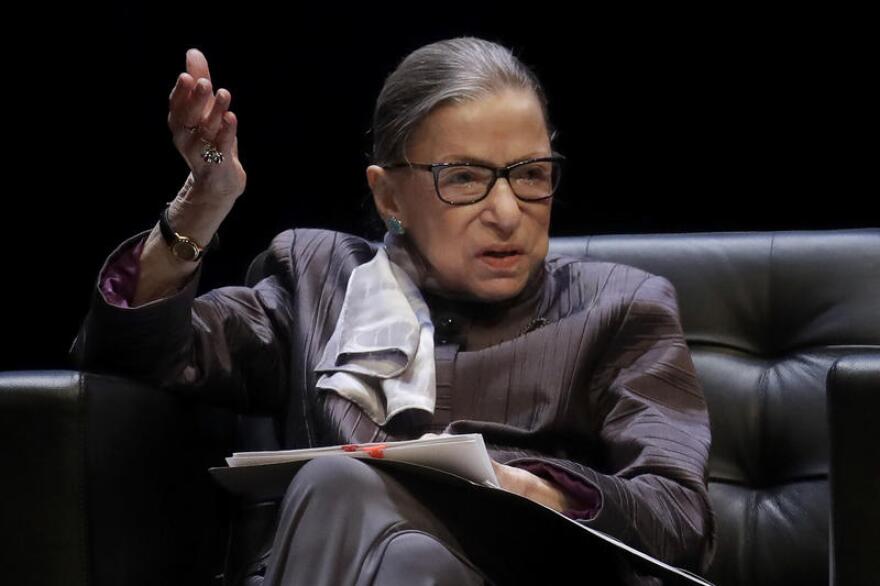Friday's passing of Supreme Court Justice Ruth Bader Ginsburg, an icon for gender equality supporters, is quickly rippling through a hotly contested Maine U.S. Senate race already shaped by judicial appointments.

Less than two hours after news of Ginsburg’s death, U.S. Senate Majority Leader Mitch McConnell announced that the Senate will quickly hold a vote on President Donald Trump’s replacement nominee, even though McConnell in 2016 blocked President Barack Obama’s high court pick because he deemed it too close to an election. McConnell’s vow, 46 days before the November election, immediately put the focus on Republican U.S. Sen. Susan Collins, who is already in the electoral fight of her three-decade long political career.
In a statement released Saturday afternoon, Collins said she does not object to the president choosing a nominee and for the Senate Judiciary Committee to begin the vetting process. However, she said does not think the Senate should vote to confirm the nominee until after the November 3 election.
"In fairness to the American people, who will either be re-electing the President or selecting a new one, the decision on a lifetime appointment to the Supreme Court should be made by the President who is elected on November third," she said.
Collins' statement did not address what she'll do if McConnell, who controls the Senate, pushes the confirmation vote despite her objections.
Collins has been fighting backlash to her controversial 2018 vote for Supreme Court Justice Brett Kavanaugh. A poll by Siena College and the New York Times released Friday showed 55 percent of respondents opposed Collins’ vote.

The same survey showed Collins trailing Democratic challenger Sara Gideon, who has made the Republican’s vote for Kavanaugh a central argument in her appeal to Maine voters.
Collins' counterpart independent U.S. Angus King called on McConnell to honor Ginsburg’s dying wish. In the days before her death from complications battling pancreatic cancer, NPR reported that Ginsburg told her grandaughter, Clara Spera, "my most fervent wish is that i will not be replaced until a new president is installed."
“With less than fifty days until the upcoming election – and an anxious, divided America watching – Senator McConnell should honor Justice Ginsburg’s life and legacy by abiding by her final wish that this vacancy not be filled until the election has been decided,” King said in a statement.
Collins on Friday issued a statement honoring Ginsburg and made no reference to McConnell’s vow to replace her.
“Justice Ruth Bader Ginsburg was a trailblazer for women’s rights, a fierce champion for equality, and an extremely accomplished American who broke countless barriers in the field of law,” Collins said. “Throughout her life, Justice Ginsburg surmounted discrimination and sexism through her brilliance, tenacity, and wit, becoming one of the most prominent legal luminaries of our time.”
What Collins says and does in the coming days will be heavily scrutinized. When McConnell blocked a hearing for the nomination of Merrick Garland because it was more than 300 days before the election, Collins said the process should move forward. On Friday, New York Times reporter Jonathan Martin tweeted that Collins told him in a recent interview that she opposed seating a new Supreme Court justice in October. Martin also said that Collins opposed seating a new justice in the lame duck session after the election.
News: @SenatorCollins told me earlier this month in Maine that she would not seat a Supreme Court justice in October.
— Jonathan Martin (@jmartNYT) September 19, 2020
“I think that’s too close, I really do,” she said.
She said she’d also oppose seating a justice in the lame duck if there’s a change in presidents.
Nevertheless, breaking with McConnell could be risky. Collins’ reelection campaign has tried to localize the race and avoid Democrats’ attempts to handcuff her to the president, a strategy designed not to alienate the Republican voters she will likely need to prevail in November.
In a message to Republican senators obtained by the Washington Post, McConnell acknowledged that there would be pressure on senators to announce how they’ll handle the coming nomination battle.
The text of that Dear Colleague letter from McConnell to GOP senators pic.twitter.com/OMaYP9XKqW
— Seung Min Kim (@seungminkim) September 19, 2020
“For those of you who are unsure how to answer, or for those inclined to oppose giving a nominee a vote, I urge you all to keep your powder dry. This is not the time to prematurely lock yourselves into a position you may later regret,” he wrote.
The looming fight has already kicked off a pressure campaign certain to intensify in the coming days. Liberal and conservative activists quickly began urging their allies to contact potential swing votes, including Collins.

In 2016, President Trump’s vow to install conservative justices on the Supreme Court helped galvanize and convince Republican voters to put him in the White House. That same year, a survey by Pew Research Center found Trump supporters were more likely than Hillary Clinton voters to call Supreme Court appointments “very important.”
A 2020 Pew survey found Democratic voters increasingly view Supreme Court appointments as important, a sentiment that could grow as Democrats confront the prospect of a 6-3 conservative majority on the high court.
Gideon, in a statement released after Ginsburg’s death, highlighted the justice’s support for women and their right to have an abortion — an issue that will be front and center in the upcoming confirmation fight.
“Throughout her life, Justice Ginsburg fought for women’s rights, reproductive rights, and a more just and fair society,” Gideon said. “Let us continue that fight in her memory and be inspired by her example for generations to come.”
Collins is one of several Republican senators facing tough reelection campaigns who will be under the microscope. Two others, Colorado Sen. Cory Gardner and Arizona Sen. Martha McSalley, have chosen to tie their fortunes to the president’s and could be more likely to support a confirmation vote this year.

Other Republicans, including South Carolina Sen. Lindsey Graham and Iowa Sen. Chuck Grassley, have declared that they would support McConnell’s 2016 position that Supreme Court appointments should not be considered in an election year.
In his leaked memo to Republican senators, McConnell attempted to reframe his 2016 position by saying that it only applied in election years when the president was from the opposite party of the one controlling the Senate.
According to a 2017 analysis by the Congressional Research Service, the median number of days from nomination to the first committee hearing for Supreme Court picks currently serving on the court is 48 days. That analysis does not include Kavanaugh, who waited more than 60 days from his nomination announcement until his first hearing.
This post was updated with Collins' statement at 4:54 p.m. Sept. 19, 2020
Updated 9:36 a.m. September 20, 2020




